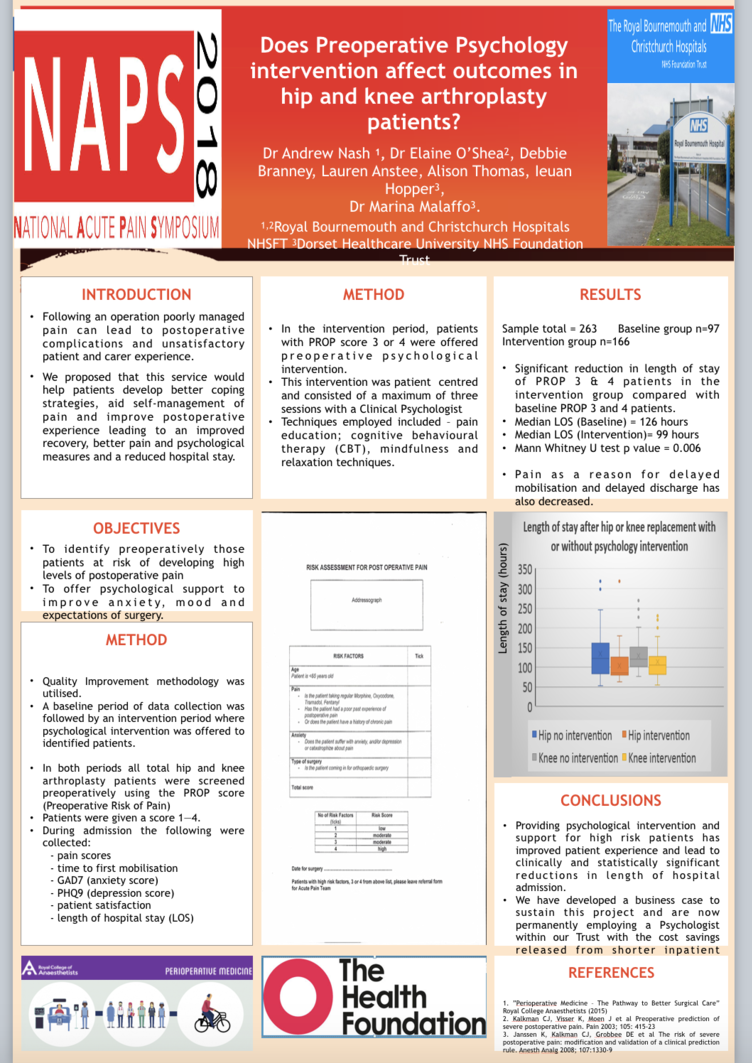Does Preoperative Psychology intervention affect outcomes in hip and knee arthroplasty patients?
Background
Our project links effectively with “Perioperative Medicine – The Pathway to Better Surgical Care” (2015)1. This document highlights the need to reduce the impact of acute pain after surgery.
Aim and Objectives
AIM:
To investigate whether preoperative psychological intervention improves patient experience and reduces length of stay in patients undergoing hip and knee arthroplasty.
OBJECTIVES:
1. Identify patients preoperatively at increased risk of developing high levels of postoperative pain.
2. Offer the high risk patients psychological support to improve anxiety, mood and expectations of surgery.
3. Assess the impact of the intervention upon patient experience, delayed mobilisation and length of hospital admission.
Method
Successful application to the Health Foundation for an Innovation for Improvement award in 2016. We used Quality Improvement methodology. All other aspects of the patient pathway for hip and knee arthroplasty have remained unchanged to improve consistency, including a standardised anaesthetic and postoperative analgesia regime.
Prior to the project starting, background data was collected using a PROP score (Preoperative Risk of Pain); each patient is given a score between 1 and 4 (Table 1). Our scoring system was a modification of the Kalkman Pain Prediction score.2,3
Patients’ pain scores, length of hospital admission and reasons for delayed mobilisation and discharge were collected seperately.
Once the project commenced, patients with PROP scores 3 or 4 were offered the preoperative psychological intervention. Psychology intervention consists of a maximum of three sessions which are individualised and patient centered. It utilizes a combination of modified Cognitive Behavioural Therapy (CBT), Mindfulness and Relaxation techniques.
During admission, patients’ pain scores, time to first mobilisation, GAD7 (anxiety score) and PHQ9 (depression score), patient satisfaction and length of hospital stay were collected.
Results
Sample total = 263
Baseline group n=97
Intervention group n=166
Our results show a definitive reduction in length of stay in PROP 3 & 4 patients in our intervention group compared with baseline PROP 3 and 4 patients.
Hip Arthroplasty:-
Median Length of Stay (Baseline) = 126 hours
Median Length of Stay (Intervention) = 107 hours.
Mann Whitney U test p = 0.006
Knee Arthroplasty:-
Median Length of Stay (Baseline) = 122 hours
Median Length of Stay (Intervention) = 104 hours
Mann Whitney U test p = 0.009
Pain as a reason for delayed mobilisation and delayed discharge has also decreased.
Patient feedback has been very positive. One patient commented, “Most people would feel anxious or concerned about a major operation and this experience was a safe place to voice and discuss those concerns. I found it extremely useful and calming and wouldn’t hesitate to recommend it to others.”
Conclusions
Providing psychological intervention and support for high risk patients has been beneficial in improving patient experience and has lead to clinically and statistically significant reductions in length of hospital admission.
We have been successful in developing a business case to sustain this project. We are now permanently employing a Psychologist within our Trust with the cost savings released from shorter inpatient admissions.

